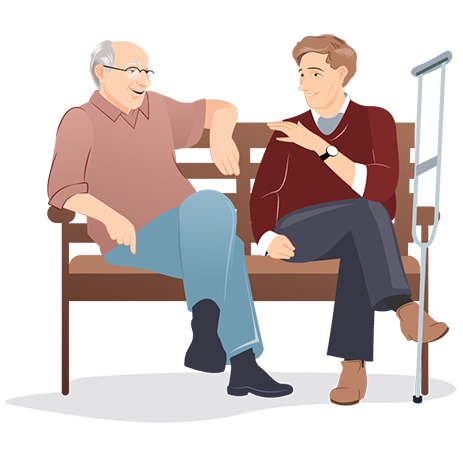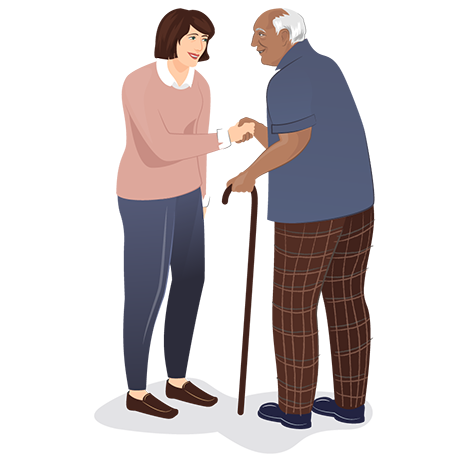
What’s the Difference between Dementia and Alzheimer’s?
Dementia is a common occurrence in older adults. Dementia is often used interchangeably with Alzheimer’s, but these terms have distinct meanings. The similarities between the two leave many wondering, what is the difference between dementia and Alzheimer’s disease?



Speak to one of our experts
Our friendly experts are here to help from 9am to 7pm, 7 days a week.
Finding the right kind of care for your elderly loved one is important, and receiving an early diagnosis can be particularly helpful with illnesses such as Alzheimer’s. The Live in Care Company is an experienced live-in care agency that provides specialist dementia live-in care around the UK.
We offer support, guidance, and a tailored care plan to ensure that your loved one is set in a familiar routine, unique to them. Read on for a detailed look into dementia and Alzheimer’s disease, potential risk factors, and how dementia live-in care can best help you and your loved ones, particularly with illnesses such as Alzheimer’s.
This guide will cover the following:
- The difference between dementia and Alzheimer’s
- What is dementia?
- What is Alzheimer’s disease?
- What causes Alzheimer’s disease?
- How does Alzheimer’s develop?
- How does a person develop dementia?
- What are the signs distinguishing Alzheimer’s?
- How is Alzheimer’s treated?
- How live-in dementia care works
- How do I find a dementia live-in carer for the elderly?
The difference between Dementia and Alzheimer’s
The main difference between dementia and Alzheimer’s is that dementia is a general term that describes a decline in cognitive function and ability. Alzheimer’s is a specific disease that affects the brain and is the most common cause of dementia. In short, Alzheimer’s is a type of dementia, but dementia is not always Alzheimer’s. Dementia has many causes (Alzheimer’s disease being one of them), and dementia progress can potentially be reversed depending on the specific disease or condition. Alzheimer’s has no definite cause, cannot be reversed, and there is no cure, although symptoms may be improved and the disease’s progress can be slowed.
Read our guide on dementia home care to understand how live-in care can ease symptoms and provide support for your loved one with dementia or Alzheimer’s disease.
What is dementia?
Dementia is the term that represents a group of neurological diseases characterised by a loss of memory, language, and other thinking abilities. These symptoms can become severe enough to interfere with everyday functioning, meaning that those living with dementia may eventually need assistance to achieve everyday tasks.
Dementia often affects more than just the brain cells and it can have a significant influence on a person’s behaviour and emotions. Some other common symptoms of dementia will:
- Decrease a person’s ability to focus and pay attention
- Change or degrade their thinking, judgement, and reasoning skills
- Affect the way they communicate and their language skills
- Promote short-term and long-term memory loss
How does a person develop dementia?
There are many different ways a person can develop dementia. A specific disease, such as Alzheimer’s, is a common cause of dementia in older people. However, reactions to medication, vitamin deficiencies, metabolic disorders, a stroke, thyroid issues, and brain tumours can all result in dementia symptoms.
There are a number of risk factors that may lead a person to develop dementia. Factors such as ageing, genetics, lifestyle, and environment can all have a big impact. For example, there is a significant increase in risk for dementia in older adults, and it’s common for dementia signs to begin to show in people in their mid-sixties. However, this may be due to other factors associated with ageing such as raised blood pressure, cardiovascular disease, changes to nerve cells, loss of hormones, weakening of the body’s natural repair systems, and changes to the immune system.
Dementia occurs when brain cells are damaged, meaning lifestyle factors such as alcohol and drug use can increase the likelihood of developing dementia symptoms, but a traumatic brain injury or an infection of the brain may also have the same effect.
Read our guide on the early signs of Dementia for a better understanding of risk factors, how dementia progresses, and how to receive an early diagnosis.
What does dementia do?
Specifically, dementia affects brain cells and their ability to communicate with each other. It can damage cells in a number of distinct regions of the brain, meaning that dementia has the ability to mainly affect some functions while leaving others less affected. The first brain cells to be damaged are often the ones located in the hippocampus, a vital part of the brain for emotion, motivation, memory, and learning. This is why some early signs of dementia include memory loss.
Dementia affects the body as well as the mind, especially in later stages as dementia progresses. However, a person’s ability to maintain their own independence can quickly diminish even before their ability to stand, walk, or get themselves up from bed is impacted.
That’s why services such as elderly live-in care can be incredibly beneficial for your loved ones as they begin to struggle with a loss of independence. This kind of care can support them mentally as well as physically and help to maintain quality of life.
Types of dementia
There are over 200 types of dementia, with Alzheimer’s disease being the most common. Other common types of dementia include Vascular dementia, Lewy-body dementia, Frontotemporal dementia, and mixed dementia.
-
Vascular dementia
Vascular dementia is a commonly diagnosed condition for people with dementia. It is a disease caused by a lack of blood flow and oxygen in the brain, resulting in damaged brain cells, blood vessels, and arteries. Symptoms include difficulties with problem-solving and a significant slowing of thought.
There is some evidence that the effects of Vascular Dementia can be eased or postponed by living a healthier lifestyle, such as eating a balanced diet. Read our guide on the ideal diet for people with dementia for more on how food can improve your loved one’s health.
-
Frontotemporal dementia
Frontotemporal Dementia is a form of dementia caused by damage to the front and sides of the brain, and it can affect behaviour, empathy, judgement, and foresight as well as language skills like speaking, writing, and comprehension.
Those diagnosed with Frontotemporal dementia can be helped through speech or language therapy, medication, or additional specialist dementia care.
-
Lewy Body dementia
Lewy body dementia is caused by abnormal protein deposits in the brain called Lewy bodies. Lewy bodies are known to build up in Parkinson’s disease patients as well, and they affect functions such as visual perception, muscle movement, and thinking. As a result, symptoms of dementia with Lewy Bodies may include confusion, disturbed sleep, hallucinations, or unsteadiness.
-
Mixed dementia
It is common for different types of dementia disease to coexist with other changes to the brain linked to Lewy bodies and Alzheimer’s disease. This is known as mixed dementia. The most common form of mixed dementia is vascular dementia combined with Alzheimer’s disease.
What is Alzheimer’s disease?
Alzheimer’s Disease is the most common type of dementia, representing about two-thirds of cases in older adults. It’s a progressive neurodegenerative disease (meaning that symptoms worsen with time), and is thought to be a result of an abnormal build-up of amyloid and tau proteins in brain cells, which can affect brain functioning. The area of the brain most commonly affected by Alzheimer’s disease is the hippocampus, a part of the brain that is critical for learning and laying-down new memories. Alzheimer’s disrupts vital processes in the brain, particularly processes that are vital to neurons and their networks. The net result of this is that communication, metabolism, and repair are affected, usually over a long period.
This is why people with Alzheimer’s disease may have difficulties with memory and in particular with memories of recent events. Long-term memory is usually better preserved as a different part of the brain is involved with these memories and this brain region is usually more protected in Alzheimer’s disease. The very front part of the brain, or the frontal lobe, can also be impacted by Alzheimer’s disease. This area deals with executive functions such as our ability to inhibit behaviour and manage emotions. This can be seen in people with Alzheimer’s when they begin acting in strange ways. Since it is a progressive disease, symptoms will continue to worsen with time, as more of the brain becomes affected. In its latest stages, a brain scan of someone with Alzheimer’s disease will show an atrophied brain. This means that the brain will physically shrink due to brain cell death.
What causes Alzheimer’s disease?
Although there are some risk factors that can increase the likelihood of getting Alzheimer’s disease, such as diseases, infections, and environmental factors, there is no clear cause acknowledged by doctors. There is no one answer to explain why someone develops Alzheimer’s. However, it is thought that living a healthier lifestyle, one that is good for your heart as well as your brain can be protective against developing Alzheimer’s.
For instance, eating a balanced diet, getting regular exercise, engaging in social activities, and actively using the brain can help reduce the risk. However, dementia and Alzheimer’s may still be a risk. This is largely due to the multiple factors that can be involved such as genetics, lifestyle, and environment.
For example, there is a form of Alzheimer’s Disease thought to be hereditary and caused by inherited genes. However, this type of Alzheimer’s is more uncommon and usually has an early onset of around 40-50 years old.
Most people with Alzheimer’s will have the idiopathic type, meaning that the disease has an unknown cause or a mechanism of apparent spontaneous origin. Often the onset for this type of dementia isn’t discovered until later on in life, after about 65 years old.
The risk for Alzheimer’s disease increases with age, such that one in 14 people are affected over the age of 65, and one in 6 people after age 80.
How does Alzheimer’s develop?
 Alzheimer’s disease can develop slowly, with symptoms not always being entirely obvious at first. It is thought that the onset of the disease and damage to the brain can begin 10 years before any noticeable memory and other cognitive problems appear. Dementia signs and symptoms will initially be mild, usually with memory difficulties apparent and some confusion with everyday tasks that used to be carried out with ease.
Alzheimer’s disease can develop slowly, with symptoms not always being entirely obvious at first. It is thought that the onset of the disease and damage to the brain can begin 10 years before any noticeable memory and other cognitive problems appear. Dementia signs and symptoms will initially be mild, usually with memory difficulties apparent and some confusion with everyday tasks that used to be carried out with ease.
Often it is difficult to detect any problems if the person suffering remains in their usual routine, it can be more evident when they are taken out of their usual environment and begin to show more confusion. Some behaviour and personality changes can occur at this stage. Dementia signs and symptoms progress to moderate with more areas of the brain being affected.
As the disease progresses, it will begin to affect language, reasoning, sensory processing and conscious thought. Memory loss and confusion grow worse, and people begin to have problems recognizing family and friends. In the severe stages of Alzheimer’s people are completely dependent on care and the person may be in bed most days as the body begins shuts down.
Why do you get dementia?
There is no one reason why someone might get dementia. There are likely multiple factors involved such as genetics, lifestyle and environment. There is an increase in risk for developing dementia as we age, and dementia signs may begin to show. This might be due to other factors associated with ageing such as higher blood pressure, increased risk of cardiovascular disease, changes to nerve cells, loss of sex hormones, weakening of the body’s natural repair systems and changes to the immune system. Dementia occurs when brain cells are damaged and this may happen as a result of a disease such as Alzheimer’s but it may also happen from a traumatic brain injury or an infection of the brain.
What are the signs distinguishing Alzheimer’s from other conditions?
It’s important to catch the signs of Alzheimer’s as soon as possible. An early diagnosis can provide your loved one with the care and attention they need to slow the disease’s progress and relieve symptoms.
Alzheimer’s disease can share many similarities with other types of dementia. The difference between these types of dementia in comparison to Alzheimer’s can be tricky to spot as all dementia diseases will severely affect the brain and result in a decline in thinking ability.
Although the overlap of symptoms can make it difficult, there are some specific signs of Alzheimer’s that doctors may use to distinguish it from other types of dementia. Doctors will use different methods to diagnose Alzheimer’s disease such as cognitive testing and neurological investigations. These can help identify the areas of cognitive function and parts of the brain that are most likely affected.
For example, Alzheimer’s Disease is more commonly known to affect the hippocampus and areas involved with learning and memory. Therefore, patients with Alzheimer’s will more commonly struggle with memory, word-finding and problem-solving. They may also lose awareness of the difficulties they are having.
Other types of dementia may show a different profile, and brain scans may reveal different parts of the brain to be more affected. For instance, with types of Lewy body dementia, such as Parkinson’s Disease, symptoms often include visual hallucinations, muscle rigidity, and sleep disturbances.
Quite often, as we age, we experience a natural decline in our thinking skills which can cause people to worry that they have dementia or Alzheimer’s disease. Although this may not be the case, it is important that you seek advice from a medical professional if you or a loved one are experiencing changes to your mood, memory, thinking skills or language.
How is Alzheimer’s treated?
Alzheimer’s Disease has no known cure, meaning that there is no disease-modifying treatment available. Some medications can be taken to help treat symptoms temporarily. These medications include Acetylcholinesterase (AChE) inhibitors that help increase levels of acetylcholine, a substance in the brain that helps nerve cells communicate with each other. The three main AChE inhibitors that are prescribed are called Donepezil, Galantamine and Rivastigmine. Memantine is another type of medication that can be given to relieve moderate to severe Alzheimer’s Disease. It helps by decreasing any abnormal activity in the brain, such as antipsychotics or mood stabilisers, and cognitive rehabilitation may also be used to help with functional tasks. Other medications may be used to help treat the behavioural symptoms of Alzheimer’s. Cognitive rehabilitation may also be used to help with functional tasks. This type of treatment can help build on current skills in order to help those with Alzheimer’s function better in their everyday life.
How live in dementia care works
Live-in dementia care works with a trained carer offering support to help the elderly person live as independently as possible. However, for progressive dementias such as Alzheimer’s Disease, this support will need to be increased and adapted more frequently as dementia symptoms worsen.
A dementia carer may need to be more specialised in managing challenging behaviour, disorientation, and personality changes in dementia care. The carer will need to be familiar with helping someone who may have no awareness of their condition and can be a danger to themselves.
Having a professional live-in dementia carer can be significantly more beneficial than placing a person with dementia in a care home for the following reasons:
- The person with dementia can remain in the security of their own home and in a familiar environment. This can be helpful in reducing their disorientation and distress.
- Friends and family will be able to come, go, and visit as easily as before.
- A person with dementia’s own home will be a place that they are familiar with, which can be very comforting to those living with dementia.
- If they do struggle to sleep, there is will be someone there just to look after them, on a one-to-one basis.
- Daily routines can be better established or maintained. This is helpful for those with dementia because they often function better with routine and structure.
How do I find a dementia live-in carer for the elderly?
At The Live in Care Company we will make the process of finding and choosing a live in carer for dementia straightforward. This includes carers who are experienced and trained in supporting their client with memory loss and all types of dementia and Alzheimer’s. Our expert team will be happy to speak to you and will take the time to understand your situation and your needs and will match you with a wonderful live-in carer. Contact us here to arrange elderly live-in care for your loved one and find the right carer today.









